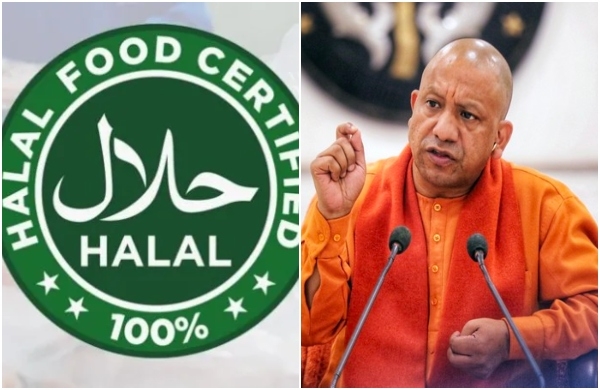Ban of Halal certification in UP? Yogi govt mulls ban on illegal Halal goods after case lodged in Lucknow
18 Nov 2023 15:23:09
The Uttar Pradesh government is planning to ban on products being sold with halal certificates after a case was lodged in Lucknow against a company and three organisations. The money is obtained illegally under the guise of a halal certificate through the use of forged documents and the illegal money is being used funding terrorist groups and anti-national activities.
Regarding such incident, an FIR has also been lodged at Hazratganj police station in this regard in Lucknow on Friday.

According to the filed FIR, entities such as Halal India Private Limited Chennai, Jamiat Ulama-i-Hind Halal Trust Delhi, Halal Council of India Mumbai, Jamiat Ulama Maharashtra, and others exploited religious sentiments to boost sales by providing Halal certificates to customers of a specific religion. Illegal businesses are being run for financial gain.
In the case lodged by Shailendra Kumar Sharma it has been claimed that the entities have no authority to give certification to any product. It has been alleged that the said entities were preparing forged certificates and issuing Halal certificates to various companies for financial gain, fostering not only social animosity but also violating public trust.
"It has come to my notice that some companies have started certifying certain products as halal to increase their sale among people from a certain community. This is being done for monetary gains with use of deceit. You can see such products in markets across the state and this is like toying with the public’s faith… Through these certificates (for halal), part of a conspiracy, advertisements are being done," Sharma said.
He has also raised concerns over a potential large-scale conspiracy, indicating attempts to decrease the sales of products from companies lacking the Halal certificate, which is illegal. It stated that there is apprehension that this unfair advantage is being passed on to anti-social and anti-national elements.
“Even vegan products like beauty oil, soaps, toothpaste etc are being given halal certificates. Such products don’t need a halal certificate. It is also being advertised among a community that products without halal certificates given by these companies should not be used. This is causing loss to businesses of the other community…This is being done not just for economic and material gains, but also to create animosity in society among communities. It is part of a conspiracy to weaken the country,” the complaint said.
The complaint also raised doubts that “financial gains from the activity are being used to fund terror outfits”.
What is Halal Certification?
A Halal Certification is a guarantee that a product - food or otherwise - has been made in keeping with the Islamic law and is unadulterated. The opposite of Halal or 'Permissible' is 'Haram' or 'Forbidden'. Certain food items such as pig meat and pig fat are banned under Islamic law.
Halal and Haram also refer to the way an animal is slaughtered. Islamic law states that an animal be slaughtered in the most humane way. When slaughtering, halal guidelines recommend that a sharp knife be used to make an incision at the front of the throat, slicing the oesophagus, and the jugular veins but not the spinal cord. The Haram way to slaughter an animal is 'jhatka' where the animal is quickly beheaded.
In India, the certification is provided by third party bodies such as the Jamiat-Ulama-E-Maharashtra and the Jamiat-Ulama-i-Hind Halal Trust, quite unlike the Arab countries where a magistrate grants the certification.
In April last year, a petition was filed in the Supreme Court demanding a complete ban on halal products and halal certifications, arguing that what started as a food certification had expanded to include even cosmetics and daily products such as soaps and shampoos.